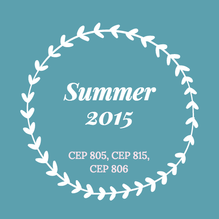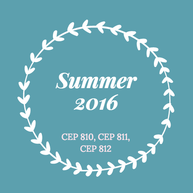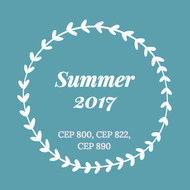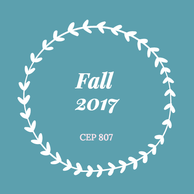ANNOTATED TRANSCRIPT OF COURSES IN MY DEGREE
Note: All of my courses were part of the Master of Arts in Educational Technology (MAET) hybrid program; each summer I took 3 courses that were blended together with projects that focused on the themes from all three courses. Therefore the "course" descriptions are project descriptions instead.
Teaching STEM Classes with Technology
Throughout the summer, we explored many new technology tools and creative ways to help our students develop deep conceptual understanding of our content. This was an eye-opening experience for me – discovering new ways to make STEM classes come to life for students by thinking “outside the box” and using technology intentionally and purposefully. We explored and played with tools online and in Makerspaces, created a book collaboratively with one of our best lesson plans, shared World of Wonder moments and re-purposed simple tools like paper and playdough for educational purposes during “quickfires” that were designed to get us exploring, creating and sharing in a really short time span. Our Deep Play groups were formed around a shared interest and we read books and experimented with a new idea in our classroom – my group focused on flipped/blended learning.
Instructional Reform: “Imagine IT”
When asked to dream a solution to a current problem of practice that I face, I chose to focus on flipping the classroom in order to do more rich problem solving in class. Essentially, I want my students to be able to “think like mathematicians” and I knew I needed to create more time – and the right culture – in my class for this level of applications and problem solving. I began creating my own instructional videos on each learning target, which took time but I also started noticing payoffs with my students’ learning. Throughout one school year I completely flipped AP Calculus, and the next year I began flipping Advanced Algebra/Trigonometry. I can’t imagine looking back to “lectures” in class anymore!
Leadership
Another component of this summer was to consider our role as teacher leaders and find ways to impact our school communities for the better. We created plans for a 'revolutionized' professional development and read Debra Meyerson’s book “Rocking the Boat: How to Effect Change Without Making Trouble” to inspire us to speak up and work for needed changes within our school or district. I am fortunate to work in a school with a very strong administration team that supports and listens to teachers. Therefore I have an easy way to speak up when I think something should change and contribute ideas to the Instructional Leadership Team.
Throughout the summer, we explored many new technology tools and creative ways to help our students develop deep conceptual understanding of our content. This was an eye-opening experience for me – discovering new ways to make STEM classes come to life for students by thinking “outside the box” and using technology intentionally and purposefully. We explored and played with tools online and in Makerspaces, created a book collaboratively with one of our best lesson plans, shared World of Wonder moments and re-purposed simple tools like paper and playdough for educational purposes during “quickfires” that were designed to get us exploring, creating and sharing in a really short time span. Our Deep Play groups were formed around a shared interest and we read books and experimented with a new idea in our classroom – my group focused on flipped/blended learning.
Instructional Reform: “Imagine IT”
When asked to dream a solution to a current problem of practice that I face, I chose to focus on flipping the classroom in order to do more rich problem solving in class. Essentially, I want my students to be able to “think like mathematicians” and I knew I needed to create more time – and the right culture – in my class for this level of applications and problem solving. I began creating my own instructional videos on each learning target, which took time but I also started noticing payoffs with my students’ learning. Throughout one school year I completely flipped AP Calculus, and the next year I began flipping Advanced Algebra/Trigonometry. I can’t imagine looking back to “lectures” in class anymore!
Leadership
Another component of this summer was to consider our role as teacher leaders and find ways to impact our school communities for the better. We created plans for a 'revolutionized' professional development and read Debra Meyerson’s book “Rocking the Boat: How to Effect Change Without Making Trouble” to inspire us to speak up and work for needed changes within our school or district. I am fortunate to work in a school with a very strong administration team that supports and listens to teachers. Therefore I have an easy way to speak up when I think something should change and contribute ideas to the Instructional Leadership Team.
'Mindsets About Technology – TPACK
One of the main emphases of this summer was about how to incorporate technology effectively in our classrooms. We learned about TPACK: how you need to find the “sweet spot” in your context where your technology, pedagogy and content knowledge all come together to fit your objective. We also discussed how technology constitutes more than digital devices and online websites; 'old-fashioned' tools are also part of technology that can be useful tools to use to teach. The takeaway of these readings and conversations is that your technology must serve a purpose, and not just to turn normal tasks (ex. worksheets) into online tasks. The Internet has truly changed the way students can learn and the digital technology that we use should take advantage of the unique ways students can explore, create and share their learning in ways they could not otherwise have. Using technology just to use technology is fairly pointless.
Wicked Problem: Failure
As educators, there are always problems that we have to solve…but this project introduced us to 'wicked problems' that are dilemmas that can’t actually be solved (in the way that math problems can be solved). My partner and I took time to explore and research the concept of 'failure' and how students perceive it. We researched ways to change students’ mindset that failure and mistakes are inherently bad – ranging from redefining 'failure,' to grading reform, to encouraging productive struggle and learning from mistakes in class.
Maker Education Project
One of the overarching goals this summer was to use technology (digital or otherwise) to help students learn our content better. This Maker education project was challenging for me. I struggled to come up with a creative and hands-on way for my students to learn advanced algebra content – but I liked being pushed to think about how anyone can be a Maker. Also, it was valuable to think about how to enable students to be more actively involved in their learning, especially for topics that are typically challenging for them.
One of the main emphases of this summer was about how to incorporate technology effectively in our classrooms. We learned about TPACK: how you need to find the “sweet spot” in your context where your technology, pedagogy and content knowledge all come together to fit your objective. We also discussed how technology constitutes more than digital devices and online websites; 'old-fashioned' tools are also part of technology that can be useful tools to use to teach. The takeaway of these readings and conversations is that your technology must serve a purpose, and not just to turn normal tasks (ex. worksheets) into online tasks. The Internet has truly changed the way students can learn and the digital technology that we use should take advantage of the unique ways students can explore, create and share their learning in ways they could not otherwise have. Using technology just to use technology is fairly pointless.
Wicked Problem: Failure
As educators, there are always problems that we have to solve…but this project introduced us to 'wicked problems' that are dilemmas that can’t actually be solved (in the way that math problems can be solved). My partner and I took time to explore and research the concept of 'failure' and how students perceive it. We researched ways to change students’ mindset that failure and mistakes are inherently bad – ranging from redefining 'failure,' to grading reform, to encouraging productive struggle and learning from mistakes in class.
Maker Education Project
One of the overarching goals this summer was to use technology (digital or otherwise) to help students learn our content better. This Maker education project was challenging for me. I struggled to come up with a creative and hands-on way for my students to learn advanced algebra content – but I liked being pushed to think about how anyone can be a Maker. Also, it was valuable to think about how to enable students to be more actively involved in their learning, especially for topics that are typically challenging for them.
Designing and Implementing an Educational Technology Conference
The year 2 cohort of students in the Master of Educational Technology program in Galway have a tradition of planning and implementing an educational technology conference each summer for our colleagues in the master’s program as well as local Irish educators. First, we planned the entire day – from logistics to speakers to communication and advertising. We also planned our schedule and designed our sessions based on how we thought good professional development should look: highly interactive sessions rather than a “sit and get” style. My partner and I researched data-based differentiation in classrooms and schools…so our session involved having our participants be our 'students' and we collected data from them, analyzed it to form differentiated groups, and then gave them a task with some amount of choice in it. In this way, we modeled how teachers can differentiate in their classroom based on their students’ data.
Research Design and Experiments
We read the book “When Can You Trust the Experts?: How to Tell Good Science from Bad in Education” by Daniel Willingham which helped give a framework to determine whether new educational theories or tools (digital technology, textbooks, etc.) are truly beneficial and appropriate for our students. This seemed very applicable because there is such a wide market for educational technology and each has great claims about what it will do – but you need to evaluate them without bias to see if they are true. Second, my group conducted an experiment (via survey) to answer the question: "Does having choice motivate students (to spend more time on projects)?" Surveying our own students to get data that really mattered, we analyzed our data and found that in our sample students reported that they would spend more time when they had choice.
Using our Personal Learning Networks to Solve Problems of Practice
This project reinforced both the importance of Personal Learning Networks (PLNs) as well as how to use the design thinking model as a framework for advising colleagues in a different discipline. My colleague was a biology teacher, so when she presented her problem of practice to me I had to reach out to biology teachers in my PLN to ask for their ideas. After I conducted my own research online and read the biology teachers’ recommendations, I put together a plan and collection of resources for my colleague that to consider using in her classroom. This prepared me to take on a leadership or technology integrator role in my school because I can use my PLN and other resources online to make helpful recommendations to colleagues even if I am not an expert myself in that area.
The year 2 cohort of students in the Master of Educational Technology program in Galway have a tradition of planning and implementing an educational technology conference each summer for our colleagues in the master’s program as well as local Irish educators. First, we planned the entire day – from logistics to speakers to communication and advertising. We also planned our schedule and designed our sessions based on how we thought good professional development should look: highly interactive sessions rather than a “sit and get” style. My partner and I researched data-based differentiation in classrooms and schools…so our session involved having our participants be our 'students' and we collected data from them, analyzed it to form differentiated groups, and then gave them a task with some amount of choice in it. In this way, we modeled how teachers can differentiate in their classroom based on their students’ data.
Research Design and Experiments
We read the book “When Can You Trust the Experts?: How to Tell Good Science from Bad in Education” by Daniel Willingham which helped give a framework to determine whether new educational theories or tools (digital technology, textbooks, etc.) are truly beneficial and appropriate for our students. This seemed very applicable because there is such a wide market for educational technology and each has great claims about what it will do – but you need to evaluate them without bias to see if they are true. Second, my group conducted an experiment (via survey) to answer the question: "Does having choice motivate students (to spend more time on projects)?" Surveying our own students to get data that really mattered, we analyzed our data and found that in our sample students reported that they would spend more time when they had choice.
Using our Personal Learning Networks to Solve Problems of Practice
This project reinforced both the importance of Personal Learning Networks (PLNs) as well as how to use the design thinking model as a framework for advising colleagues in a different discipline. My colleague was a biology teacher, so when she presented her problem of practice to me I had to reach out to biology teachers in my PLN to ask for their ideas. After I conducted my own research online and read the biology teachers’ recommendations, I put together a plan and collection of resources for my colleague that to consider using in her classroom. This prepared me to take on a leadership or technology integrator role in my school because I can use my PLN and other resources online to make helpful recommendations to colleagues even if I am not an expert myself in that area.
Capstone: Pro-Seminar in Educational TechnologyInstructors: Dr. Matthew Koehler, Sarah Keenan Lechel, Spencer Greenhalgh, and Brittany Dillman
This capstone portfolio course is the culmination of my master’s degree. The focus is to create an online portfolio to showcase my journey throughout the program. By giving and receiving peer feedback each week, I have revised my website during the course to even better represent myself as a mathematics educator. This course has helped me reflect on the process of being a lifelong learner and hopefully I will continue to be curious and explore even better ways to teach my students.
|
|
|
Click to see a showcase of my work from these courses.
|




